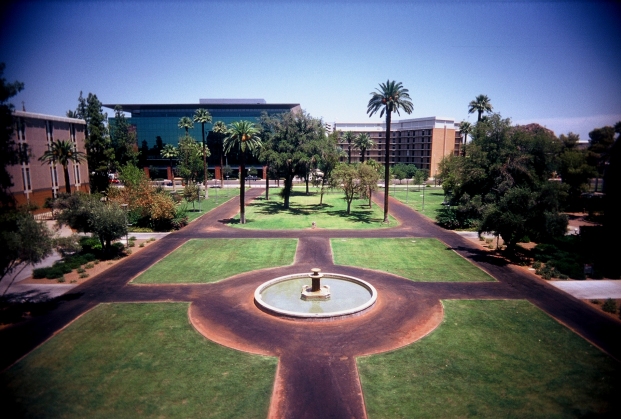
The controversial class in question is taught at Arizona State University. Kevin Doole/AP Photos
By Abigail Heinmeyer
College campuses have frequently been considered breeding grounds for abstract thought and radical ideas. While open-minded discussions are accepted in the classroom, they are not always as welcomed by the general public. The latest example of this phenomenon can be seen at Arizona State University.
With the introduction of a new course, titled “Studies in American Literature/Culture: U.S. Race Theory & the Problem of Whiteness,” the university is receiving backlash from national media sources and critics.
The controversy was originally sparked by an article written for campusreform.org by ASU student Lauren Clark. Though Clark did not overtly criticize the advanced English course, she did quote fellow ASU student, James Malone, in saying that “it shows a significant double standard of higher education institutes.” This student believes that “they would never allow a class talking about the problem of ‘blackness’” but, “you can certainly harass people for their apparent whiteness.”
Clark’s article later received national attention when it was republished on Fox Nation. In addition, the student was interviewed on “Fox and Friends” for a “Trouble With Schools” segment, hosted by Elizabeth Hasselback.
In the piece, Clark expressed concern for the required readings of the course, stating that “all of these books have a disturbing trend, and that’s pointing to white people as a root cause of social injustices for this country,” which, she believes, “causes more problems than solutions.”
Hasselback agreed with Clark, claiming that the topic of the course is “quite unfair, and wrong, and pointed.” The Fox host also questioned whether a course surrounding “the problem with blackness or the problem with being female” would “fly at the university.”
Following the airing of this segment, ASU and the professor of the course, Lee Bebout, received considerable backlash. On Friday, Jan. 30, the university released a statement regarding the class:
“This course uses literature and rhetoric to look at how stories shape people’s understandings and experiences of race. It encourages students to examine how people talk about — or avoid talking about — race in the contemporary United States. This is an interdisciplinary course, so students will draw on history, literature, speeches and cultural changes — from scholarly texts to humor. The class is designed to empower students to confront the difficult and often thorny issues that surround us today and reach thoughtful conclusions rather than display gut reactions. A university is an academic environment where we discuss and debate a wide array of viewpoints.”
Though Clark and Hasselback have received considerable support for their critique, it is difficult to see past the many faults in their argument against this course – the first being that neither one has a strong foundation to build upon.
As neither of the women are of the course’s current eighteen students, nor have they seen the syllabus, it is hard to consider them reliable sources or, therefore, critics. As Fordham’s Dr. Mark Naison, of the African-American Studies and History departments, said, “You cannot assess how open a class is to varying points of view unless you hear the lectures, participate in class discussions and do the readings.”
As for the topic of “whiteness,” Naison states that it is “a legitimate field of study” because “throughout American history, huge advantages were given to people who were defined as ‘white,’” which is a characterization that has “changed over time, as well as the advantages attached to the designation.”
The Fordham professor not only touches upon this topic in both his undergraduate and graduate courses on African-American history, included it in his book, “White Boy: A Memoir,” which has been taught at other universities, such as Princeton.
As a nation, we have experienced so much racial tension — not just in past history but in recent months as well. Whether at Arizona State or Fordham University, is it not the responsibility of colleges to provide students with opportunities to better grasp the world around them? And is it not our duty as citizens to acknowledge the issues of the past and present in order to remedy them?
Abigail Heinmeyer, FCRH ’17, is an International Political Economy major from Bethel, CT.
